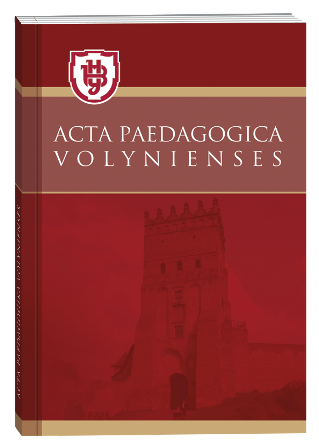THE INFLUENCE OF MOTOR ACTIVITY ON THE COGNITIVE DEVELOPMENT OF PRESCHOOL CHILDREN
DOI:
https://doi.org/10.32782/apv/2022.1.1.20Keywords:
motor activity, kinesophilia, mental and physical development, cognitive development, psychomotor skillsAbstract
The article presents the influence of motor activity on the cognitive development of preschool children. The relevance of the research topic is due to the deterioration of physical and mental development of preschool children, which is evidence of reduced motor activity. One of the values of preschool education is “strengthening of physical, mental and social health”. Timely organized motor activity lays the foundations for its further effective development in other areas of development of the child’s personality. The purpose of the article is in the theoretically studying and substantiating the impact of motor activity on the cognitive development of preschool children. The definition of “motor activity” is presented. Optimal motor activity serves as a kind of regulator of growth and development of the preschool child. Due to sufficient physical activity, preschool children have good health, physical development and learn exercise faster. An important factor in the growth and development of the child’s body is kinesophilia – meeting the organic need for movement. Kinesophilia provides an opportunity to introduce systematic physical education classes not only in systematic trainings and classes, but also in everyday life. The main part of cognitive abilities is manifested in childhood. Analysis of research by physiologists, psychologists, teachers has identified the concept of “psychomotor skills”. It is known that in infancy the motor sphere begins to develop. The gradual development of motility ensures the formation of all mental functions of the child. In cases of neglect, unfavorable conditions of upbringing, the child may experience delays / disturbances / slows down the development of mental processes, which are difficult to compensate in the future. Motor activity is a source of health, efficiency, as well as a factor in the development of psychomotor skills, perception, attention, thinking, memory – the cognitive sphere of the preschooler. Motor activity is a necessary condition for the formation of the child not only as a biological being, but also as a social subject.
References
Аршавский И. А. Ваш малыш может не болеть: физкультура для здоровья. Москва : Советский спорт, 1990. 30 с.
Базовий компонент дошкільної освіти. URL: https://mon.gov.ua/storage/app/media/rizne/2021/12.01/Pro_novu_redaktsiyu%20 Bazovoho%20komponenta%20doshkilnoyi%20osvity.pdf (дата звернення: 14.12.2021).
Бар-Ор О., Роуланд Т. Здоровье детей и двигательная активность: от физиологических основ до практического применения. Київ : Олимп. л-ра, 2009. 527 c.
Вільчковський Е.С., Денисенко Н.Ф. Організація рухового режиму дітей дошкільних навчальних закладах: навчально-методичний посібник. Тернопіль: Мандрівець, 2008. 128 с.
Вільчковський Е.С., Курок О.І. Теорія і методика фізичного виховання дітей дошкільного віку : навч. пос., Суми: 2005. 428 с.
Вільчковський Е.С., Біленька Г.В., Богініч О.Л. Сюжетні заняття з фізичної культури з дітьми дошкільного віку. Київ : ІЗМН, 1996. 76 с.
Ильин Е.П. Психомоторная организация человека. Санкт-Петербург : Питер, 2003. 382 с.
Левшунова К.В. Рухова активність в системі психічного благополуччя дошкільника. Актуальні проблеми психології : зб. наук. пр. Інституту психології імені Г.С. Костюка НАПН України, том ІV, Вип.8, Київ : 2012. 168–178 с.
Левшунова К.В. Рухова активність як чинник психічного благополуччя дошкільників : дис. … канд. псих. наук : 19.00.07. Київ, 2015. 23 с. URL : http://psychology-naes-ua.institute/files/pdf/3_1441877073.pdf (дата звернення: 14.12.2021).
Максименко С.Д. Загальна психологія. Київ : Центр навчальної літератури, 2004. 272 с.
Озеров В.П. Психомоторные способности человека. Дубна : Феникс, 2002. 310 с.
Пасічник В.М., Сосновський Д.Д. Оцінка фізичного і розумового розвитку дітей старшого дошкільного віку. URL: https://sportpedagogy.org.ua/html/journal/2012-07/12pvmspa.pdf (дата звернення: 15.12.2021).
Породько М.І. Корекція психомоторного розвитку дітей з розладами аутистичного спектру засобами фізичного виховання : дис. … канд. пед. наук : 13.00.03. Київ, 2021. 201 с.
Сімко А.В. Психолого-педагогічні особливості організації рухової активності дітей дошкільного віку з психофізичними порушеннями в сім’ї. Актуальні питання колекційної освіти (педагогічні науки). 2016. Випуск № 8. URL : https://aqce.com.ua/vipusk-n8-2017/simko-av-psihologo-pedagogichni-osoblivosti-organizacii-ruhovoiaktivnosti.html (дата звернення: 14.12.2021).
Шалар О.Г. Ефективний шлях поліпшення рухової активності підлітків – процесуально-діяльнісний етап самостійних занять фізичними вправами. Теорія та методика фізичного виховання. 2003. № 4. С. 6–12.
Яворська Т Є. Гармонійний розвиток дитини дошкільного віку в процесі використання оздоровчих інноваційних технологій. Слобожанський науково-спортивний вісник. 2013. № 5. С. 300–303.
Developmental potential in the first 5 years for children in developing countries / S. Grantham-McGregor, Y.B. Cheung, S. Cueto [et al.]. Lancet. 2007. Vol. 369. P. 60–70.







